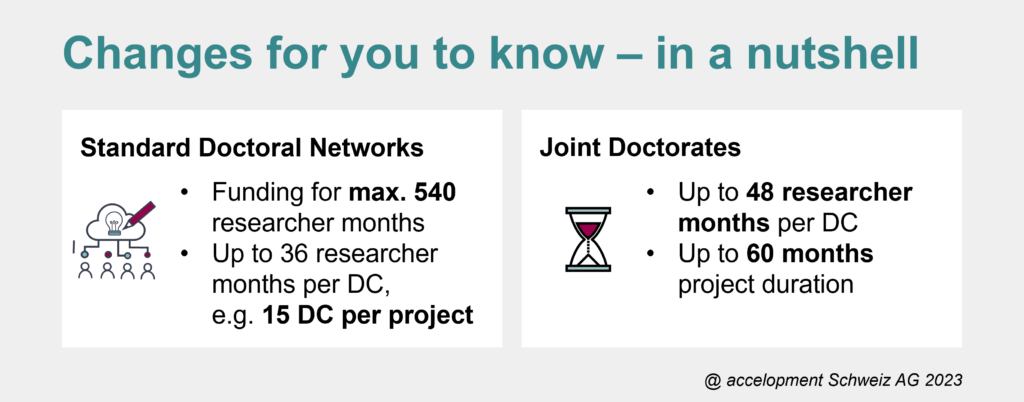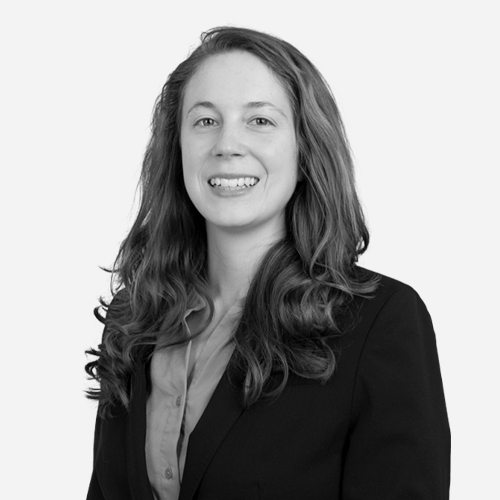MSCA 2023 Doctoral Networks call – the most important changes and novelties
5th June 2023 at 5:09 pm
The 2023 call for the Marie Skłodowska-Curie Actions (MSCA) Doctoral Networks (DN) is now open for submissions. This means it is also time for our annual analysis of the updated call documents. We had a look at the latest Guide for Applicants and the Standard Proposal Template to see what changed relative to the 2022 call.
More researcher months for standard Doctoral Networks
Some may have heard whispers around Europe that the EC would increase the maximum number of researcher months funded per DN again. These rumours proved to be true. The standard DNs may now request funding for up to 540 researcher months again. The maximum funding per doctoral candidate (DC) of 36 researcher months remains the same. Standard DNs can therefore include up to 15 DCs.

New incentives for the Joint Doctorates
The second significant change to the previous years is the new incentive created for the Joint Doctorates (DN-JD). These may now recruit DCs for a maximum of 48 months, instead of 36 months, while the maximum number of funded researcher months remains at 540. According to the Guide for Applicants, it is allowed to have different fellowship durations within a single project, e.g., 5 DCs recruited for 48 months and 8 DCs recruited for 36 months. To account for the increase in recruitment duration, the maximum project duration has also been increased from 48 to 60 months.
No more letters of commitment for associated partners
The EC no longer requires a letter of commitment for associated partners to be included in Part B2 of the proposal. This is a welcome change, as acquiring these letters posed a significant administrative burden during the already busy proposal preparation phase. Associated partners, including any links to beneficiaries, still have to be indicated in the administrative forms (Part A), in the list of participating organisations in Part B1 of the proposal and in the profiles section in Part B2.
Changes in the Part B1 and B2 templates
The changes to the Part B1 and B2 templates were relatively few compared to previous years. Nevertheless, there are some key changes to be aware of, especially if resubmitting a 2022 DN proposal.
| Item | 2022 | 2023 |
| Role of non-academic sector in the training programme | Required sub-heading under section 1.3. | No longer required. The involvement of the non-academic sector should, however, be well-explained throughout the document and highlighted in the impact section (2.1a). |
| Supervisory board | Required sub-heading under section 3.1 | Now section 5 in Part B2. Also includes a new table to indicate the supervision arrangements for each DC. |
| Letters of Commitment | Section 7 in Part B2. | Not required anymore. Pre-agreement letters for DN-JDs still have to be included. |
Apart from these key changes, the annotations in the Standard Proposal Template are also worth carefully reading. Some annotations have been revised or expanded, notably for sub-headings “Overall methodology”, linking to table 3.1g Implementation risks, and the “Artificial Intelligence”. Part B remains split into the B1 and B2 documents that must be submitted as two separate PDFs. Part B1 still has a page limit of 34 pages (including cover page, table of content, and partner list), while no page limit applies to B2.
Part A remains unchanged
Part A of the proposal remains unchanged. To save efforts, be aware that beneficiaries and associated partners still do not need to fill the list of publications, previous projects and infrastructure in Part A, as all of these are to be included in the participant descriptions in Part B2. Information about the researchers involved also does not have to be provided for any associated partners.
Starting your DN proposal journey
Are you planning to submit a DN proposal to this year’s call? Ensure you have all the necessary documents ready, and regularly check the call on the Funding & Tenders Portal for important updates. We regularly publish blog posts on Doctoral Networks and other Horizon Europe funding topics. You can subscribe to our blog updates in our blog main area.
As an associated partner in two newly-funded and five ongoing Horizon Europe DNs, as well as many successful ITNs funded under Horizon 2020, we at accelopment have gathered a great deal of practical experience in Proposal Writing, Project Management and Dissemination support as well as Transferable Skills Training all geared toward DNs. If you are interested in our support for your upcoming DN proposal, feel free to contact us. Also, check out our Transferable Skills Online Modules to complement your training programme.

Jacqueline Strehler
Research & Innovation Project Manager
